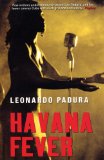Summary | Excerpt | Reviews | Beyond the Book | Readalikes | Genres & Themes | Author Bio

What was extraordinary was that he’d not chosen that shadowy
mansion in El Vedado, with its neo-classical pretensions and
debilitated structure, as a result of any odour and much less as
a result of his shouting in the street. In fact, Mario Conde was
almost convinced he was suffering from a progressive loss of smell,
and had already spent three hours on that sultry Cuban September
afternoon banging on doors and getting no for an answer, on
several occasions because a colleague had passed that way before
him. Sweating like a pig, fed up, and fearful of the storm heralded
by the rapid accumulation of black clouds on the nearby coast,
Conde was preparing to sign off for the day, totting up his losses in
the time-wasted column when, for no particular reason, he opted to
go down a street parallel to the avenue where he’d thought he’d be
able track down a minicab. Had the tree-lined pavement appealed,
did he think it was a shortcut or was he simply, quite unawares,
responding to a call from fate? When he turned the corner, the
decrepit mansion came into view, shuttered, barred and swathed
in an air of profound abandonment. His immediate reaction was
that someone must have already beaten him to it, because that
style of edifice was usually profitable: past grandeurs might include
a library of leather-bound volumes; present penury would include
hunger and despair, and that formula tended to be a winner for a
buyer of second-hand goods. However, despite his bad run over
recent weeks, the Count yielded to the almost irrational impulse
driving him to open the wrought-iron gate, cross the subsistence
plot of banana trees, rickety clumps of maize and rapacious sweet
potato lianas and climb the five steps that led to the cool porch.
Barely pausing to think, he lifted the greenish bronze knocker on
the indestructible black mahogany door, that hadn’t seen a coat of
varnish since the discovery of penicillin.
“Hello,” he greeted the person opening the door, and smiled
politely, as etiquette dictated.
The woman, whom Mario Conde tried to place on a scale
descending from seventy to sixty, didn’t deign to reply and eyed him
severely, imagining her “visitor” was quite the opposite: a salesman.
She wore a grey housecoat blotched with prehistoric grease stains
and her hair was discoloured and flaked with dandruff. Furrowed
by pale veins, her skin was almost transparent and her eyes seemed
appallingly desolate.
“I’m sorry to bother you . . . I buy and sell second-hand books,”
he went on, avoiding the word “old”, “and was wondering if you
might know someone . . .”
This was the golden rule: you madam are never so down and
out that you need to sell your library, or your father’s – once a
doctor with a famous consultancy and a university chair – or your
grandfather’s, who was perhaps even a government senator if not
a veteran from the wars of independence. But you might know of
someone?. . .
As if deadened to emotion, the woman showed no sign of
surprise at the mission of the man on her doorstep. She stared
at him impassively for a few lengthy, expectant moments, and
Mario Conde felt himself on a knife-edge: his training told him
a huge decision was being reached by the parched brain of that
translucent woman, in desperate need of fats and proteins.
“Well,” she began, “the fact is I don’t . . . I mean, I don’t know if
in the end . . . My brother and I had been thinking . . . Did Dionisio
tell you to come?”
Conde glimpsed a ray of hope and tried to relate to the question,
but felt he’d been left dangling in the air. Had he perhaps hit his
target?
“No . . . who is Dionisio?”
“My brother,” the enfeebled woman went on. “We have a library.
A very valuable one . . . Do come in . . . Sit down. Wait a moment
. . .” and the Count thought he detected a determination in
her voice that could see off life’s hardest knocks.
Excerpted from Havana Fever by Leonardo Padura Copyright © 2009 by Leonardo Padura. Excerpted by permission of Bitter Lemon Press. All rights reserved. No part of this excerpt may be reproduced or reprinted without permission in writing from the publisher
Your guide toexceptional books
BookBrowse seeks out and recommends the best in contemporary fiction and nonfiction—books that not only engage and entertain but also deepen our understanding of ourselves and the world around us.